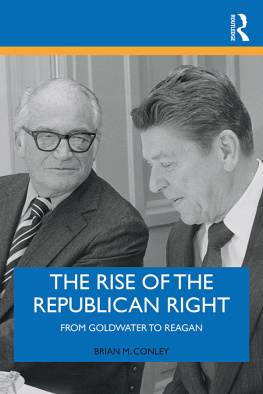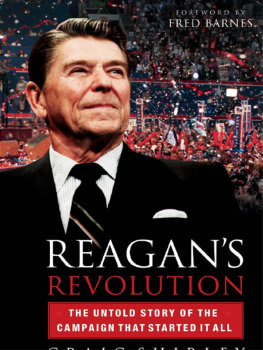Rule and Ruin
Studies in Postwar American Political Development
Steven Teles, Series Editor
Series Board Members:
Paul Frymer
Jennifer Hochschild
Desmond King
Sanford Levinson
Taeku Lee
Shep Melnick
John Skrentny
Adam Sheingate
Reva Siegel
Thomas Sugrue
The Delegated Welfare State: Medicare, Markets, and the Governance of Social Policy
Kimberly J. Morgan and Andrea Louise Campbell
Rule and Ruin: The Downfall of Moderation and the Destruction of the Republican Party, From Eisenhower to the Tea Party
Geoffrey Kabaservice
RULE AND RUIN
The Downfall of Moderation and the Destruction of the Republican Party
From Eisenhower to the Tea Party
Geoffrey Kabaservice


Oxford University Press
Oxford University Press, Inc., publishes works that further
Oxford Universitys objective of excellence
in research, scholarship, and education.
Oxford New York
Auckland Cape Town Dar es Salaam Hong Kong Karachi Kuala Lumpur Madrid Melbourne Mexico City Nairobi New Delhi Shanghai Taipei Toronto
With offices in
Argentina Austria Brazil Chile Czech Republic France Greece Guatemala Hungary Italy Japan Poland Portugal Singapore South Korea Switzerland Thailand Turkey Ukraine Vietnam
Copyright 2012 by Geoffrey Kabaservice
Published by Oxford University Press, Inc. 198 Madison Avenue, New York, NY 10016
www.oup.com
Oxford is a registered trademark of Oxford University Press
All rights reserved. No part of this publication may be reproduced, stored in a retrieval system, or transmitted, in any form or by any means, electronic, mechanical, photocopying, recording, or otherwise, without the prior permission of Oxford University Press.
Library of Congress Cataloging-in-Publication Data Kabaservice, Geoffrey M.
Rule and ruin: the downfall of moderation and the destruction of the Republican Party, from Eisenhower to the Tea Party / Geoffrey Kabaservice.
p. cm.
Includes bibliographical references and index.
ISBN 978-0-19-976840-0 (hardcover : alk. paper) 1. Republican Party (U.S.: 1854) 2. United StatesPolitics and government19451989.
3. United StatesPolitics and government1989 I. Title.
JK2356.K33 2012
324.2734dc22 2011016422
9 8 7 6 5 4 3 2 1
Printed in the United States of America
on acid-free paper
To my sister,
Marah Michele Kabaservice
All things in moderation, including moderation.
attributed to Petronius
CONTENTS
The Republican Party at the 1960 Convention
Advance Magazine and the Decay of the Moderate Establishment, 196163
The Republican Primaries of 1964
The GOP and the Goldwater Campaign, 1964
Moderates Attempt to Regain Control of the GOP, 1965
From Rat Finks to Reagan, 1966
Moderations Zenith and George Romneys Rise and Fall, 1967
Moderate Half-Victories and the Agonies of 1968
Richard Nixons First Year in Office, 1969
Nixon and the Breakup of the Moderate Republican Movement, 1970
Moderate Republican Decline from Nixon to Ford to Reagan, 197180
The Collapse of the Moderate Republicans, 19802010
ACKNOWLEDGMENTS
Some books flow so easily from the authors mind to the page that they seem almost to write themselves. This was not one of those books. It was written under extremely trying circumstances, and every aspect of its development has been difficult. My work has not been supported or subsidized by any institution or political organization, so I have been as independent as an independent scholar can be. But this book never would have appeared if not for the assistance of many people over the past six years.
My thanks go first of all to the men and women I interviewed, including several who did not wish to be identified, whose recollections allowed me to piece together the largely unwritten history of the moderate Republican movement. I am particularly grateful to Bill Bagley, Bruce Chapman, Bill Frenzel, Howard Gillette, Lee Huebner, Steve Livengood, John McClaughry, Tanya Melich, and Mike Smith for their patience in working with me on repeated occasions to see that I got my facts straight, though of course our interpretations are bound to differ.
I greatly relied on assistance from the librarians, archivists, and staff at the dozens of libraries and historical societies I visited. I especially appreciate the help I received at the libraries of Cornell and Georgetown universities, the American Library of Paris, Yales Manuscripts and Archives Library, and the Madison Building at the Library of Congress (despite its architectural shortcomings). I thank those who granted me access to collections not available to the general public, including John B. Anderson, Edward W. Brooke, Christopher Buckley, William F. Buckley Jr., John C. Danforth, and William A. Rusher. My thanks also to the generous people who shared privately held documents, unpublished papers, and other materials that otherwise would have been difficult or impossible to obtain, including Christopher Bayley, Jason Bezis, Don Bliss, Ron Boster, Bruce Chapman, William Coleman, Martha Grant, Bill Gradison, David Hamstra, Amo Houghton, Andrew Kilberg, Charles McC. Mathias, John McClaughry, Tanya Melich, Kevin Michel, Jim Reichley, Mike Smith, Edith Sontag, William R. Steiger, Peter Viereck, and Charles Whalen. Steve Livengood belongs in a special category of praise for saving much of the Ripon Societys archives from destruction.
I was fortunate to be offered a visiting assistant professorship in history at Yale University in 200708. I am thankful to Cynthia Russett for suggesting me for the position and to my students there, who were a joy to advise and teach. Thanks as well to Pietro Nivola and Strobe Talbott of the Brookings Institution for providing access to the library and scholars of that estimable organization. Some of the biographical profiles in this book appeared in their earliest form on the website www.FrumForum.com, and I am deeply grateful to Danielle and David Frum for their interest in my work and for providing an opportunity to share it with their online audience.
I appreciate the assistance and sympathy of my agent, Michael Carlisle, and of my friend Donald Lamm, with whom I discussed this book at its earliest stages. I thank Steven Teles, the editor of this series, for his unflagging interest and support. My editor, David McBride, improved the manuscript in manifold ways and provided invaluable historical perspective. So did Sarah Hammond, whose brilliant and perceptive comments made me laugh, furrow my brow, and rethink. Jonathan Moores suggestions on my sections dealing with George Romney were extremely helpful. Thanks also to David A. Bell for allowing me to present an early version of .
A legion of friends helped keep me from going under throughout the grueling process of completing this manuscript. I never would have made it if not for the support of Bill Beinecke, Heather Chase, Sarah Hammond, Manfred and Andrea Huterer, Jo Miller, and Ann Mulrooney. During the past several years in the Washington, D.C. area, I have benefited mightily from the friendship and hospitality of J. J. Barkas, Linda and Simon Carney, Sarah Collins, Jackie and Tony Dobranski, Sherri and Wil Etheredge, Anais and Tim Hughes, Ann Kammerer, Gretchen and Bruce Kirby, Jennifer and Charles Kirchmaier, Christine and John Millett, and Agata and Christopher Williams. Further afield, I am most grateful to Emily Artinian and James Smith, Brian Bell, Tracy Benedict, Alicia Ching, Courtney Davis, Jake Dell, Sheila and David Fieldhouse, Marja and Fergal Gaynor, Soli and Ken Goodall, Aliina Hirschoff, Jonathan Holloway, Tim Hutton, Steve Isenberg, David Koistinen, Elizabeth and Charley Krawczyk, Elizabeth Letcher, Huiping Pang, Alisa Plant, Tina Reyes, Marco Rosenbaum, Sophie and Justin Shubow, Sebastian Sotelo, and Allan Soave. Thanks also to LCH for incentive and the Elizabethan Club for tea.
Next page




